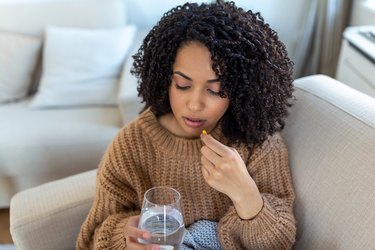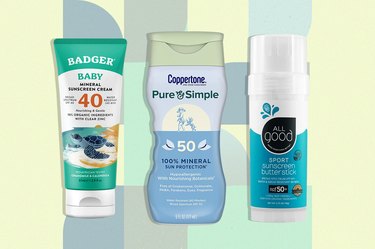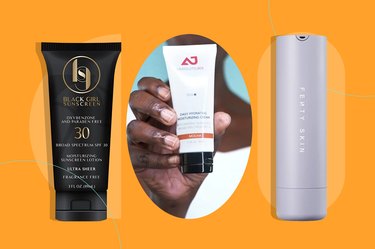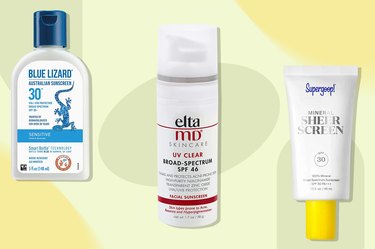
Too much sun exposure isn't good for anyone. But if you're using blood pressure medication, you should know greater sun sensitivity has been linked to the use of some medications for blood pressure.
Medicine and Sun Sensitivity
Video of the Day
One type of blood pressure-lowering medication called hydrochlorothiazide has been connected to a higher risk for skin cancer, according to the American Academy of Dermatology (AAD). This may be because hydrochlorothiazide makes the skin more sun-sensitive.
Video of the Day
Hydrochlorothiazide (HCTZ) is sometimes used alone or as a part of a combination of medications to treat high blood pressure. It's part of a group of medications called diuretics. Hydrochlorothiazide is also used in people with congestive heart failure or kidney problems.
Although HCTZ can make the skin more sun-sensitive, at the same time, sunlight appears to be helpful in lowering blood pressure, says Raymond Townsend, MD, director of the hypertension program at the Hospital of the University of Pennsylvania in Philadelphia. "Summer months witness lower blood pressure, at least in the more northerly climates of the U.S.," he says. "It's a balance though between a good exposure and an exposure that would make our dermatology colleagues cringe."
Sunlight helps your body make vitamin D, and that helps your body in many different ways, including blood pressure regulation, Dr. Townsend says.
Tips for Safe Sun Exposure
So, what's the right sun exposure if you're using the blood pressure medication HCTZ? Experts generally say you don't need to avoid the sun entirely, but you should use a little more caution.
"It's best to talk with your blood pressure doc before that Jersey Shore visit and plans to soak up some rays," Dr. Townsend says.
In addition, consider these seven ways to help control your sun exposure when using an HCTZ medication for blood pressure.
1. Consider Your Skin Cancer History
Having previous skin cancer raises the risk for developing it again. If your doctor is considering HCTZ for your high blood pressure, make sure the doctor knows if you've had skin cancer. Your doctor may want to prescribe a different type of medication instead.
2. Always Talk to Your Doctor Before Stopping Any Medication
It's important to lower your blood pressure if your doctor says you should. If you don't, you could be at a higher risk for a stroke or heart attack.
Using a medication like HCTZ for a short time period won't have a major effect on your skin cancer risk. It's better to keep using it until you can get that appointment with the doctor who manages your blood pressure and talk about any risks.
3. Avoid Tanning Beds
No matter what medication you use, exposure to tanning beds or sun lamps can raise your risk for skin cancer, even after just one use, according to the AAD.
4. Always Use Sunscreen
Wear sunscreen every day, and reapply it every two hours and again after swimming, Dr. Townsend says.
5. Wear Sun-Protective Clothing
Sun-protective clothing has UV protection in the fabric. You can find many options that fit the bill, including wide-brimmed hats, long-sleeved shirts, pants and sunglasses.
6. Know When to Seek Shade
The sun's rays are strongest from 10 a.m. to 2 p.m. As much as you can, stay indoors or under shade during that time period, per the AAD.
7. Check Your Skin Regularly
Look unusual moles or growths, and let your dermatologist know if something has changed. Identifying early changes to your skin can help ensure early treatment for skin cancer, according to the AAD. You may also want to consider getting regular dermatology checks as recommended by your dermatologist.
Is this an emergency? If you are experiencing serious medical symptoms, please see the National Library of Medicine’s list of signs you need emergency medical attention or call 911.


